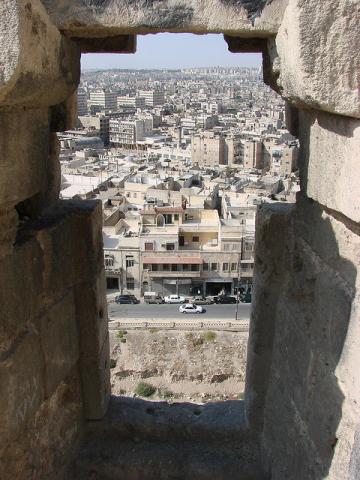
Published in the January-February 2013 NewsNotes
The following article by Syrian Fadi Hallisso, SJ was the basis for his December 13, 2012 presentation to a Pax Christi International workshop in Amman, Jordan. Fadi, who is from Aleppo, is supporting Syrian refugees in Lebanon with Jesuit Refugee Services. Noting that the number of Syrian refugees in surrounding countries now exceeds half a million, Fadi writes that as the world tries to understand what is really going on in Syria, the month-long punishment of Aleppo is leading to starvation. Immediate political, humanitarian, reconstruction, peacemaking action is essential. He continues …
The appeals we are getting every day from different regions of Aleppo are heartbreaking; people are cutting trees from streets and public gardens in the absence of any other heating resources, nearly 40,000 people are facing the winter under tents. Fights over food between children in the streets, and kilometers-long lines in front of the few bakeries that haven’t already been bombed are becoming common in what used to be Syria’s industrial center. One of Aleppo’s neighborhoods, after 12 days of electricity blackout, witnessed people shouting in the streets "we want freedom no more, we want an Islamic khalif"…
Increasingly, we are noticing the petro-dollar’s interference; businessmen from the Arab gulf countries are financing, on their own, armed brigades to force their own salafist-wahabi agendas…
The hatred in some areas is reaching dangerous levels. Despite rumors and isolated incidents, we have not yet had religious or ethnic cleansing, but the ongoing violence, the continuous bombardment and collective punishment tactics by the regime portend a potential for vindictive mass murders in the future.
Many gangsters pretending to be Free Syria Army (FSA) are taking advantage of the chaos to kidnap people for ransom. Others in Aleppo are looting private and public factories to sell machines for low prices.
Unfortunately, bad news about Syria is all the media covers nowadays. No one is talking about the courageous civilian activists who are risking their lives on a daily basis to promote values like civil society, equality, and freedom, or even to organize life in the afflicted areas. For instance, no importance was given at all to the martyrdom of Mustafa Karahman, a Shiite young man from Aleppo (many describe the revolution as a Sunni one). Mustafa worked with a group of friends in Bustan Al-Qaser, Aleppo to organize life in their neighborhood, clean up the garbage that the state won’t gather anymore, and reopen the school. At the same time Mustafa was organizing demonstrations against the regime and the looting of some of FSA members as well. He contributed to making their neighborhood one of few called "the conscience of the revolution." Unfortunately he was one of six victims killed when the regime bombarded their demonstration.
No one will tell you about the magnificent initiatives by young Syrians to organize daily life in many areas where the state is not present anymore. No one is giving credit to the brave ones who are still trying to communicate their message of freedom and dignity through tens of newspapers and magazines produced under shelling and security forces’ prosecution. No one will tell you that young Syrian activists who were forced to flee the country have nine radio stations broadcasting over the internet. One of those stations was campaigning for months for nonviolent tactics…
Syrians feel abandoned -- left alone during the last 20 months to face the most brutal dictatorship on the planet… The diplomatic failure of the international community is unacceptable, as is giving the Syrian people two hard choices: being slaughtered or asking for a NATO intervention that won’t come until the last moment. The inability of international diplomacy to produce a diplomatic resolution of the Syrian crisis is shameful in one sense and unbelievable in another.
History shows that most of our fears of coming sectarian violence are justified, especially since the bad experience of countries like Lebanon and Iraq are so vividly present in our collective consciousness. On the other hand, the daily experience of surviving in the current Syria shows that this can be avoided if Syrians from different sectarian and ethnic affiliations work hand in hand to serve their citizens.
That is at least what the daily experience of volunteers who are organizing life and relief efforts in every Syrian city shows. Young Syrians are discovering each other through this crisis; they are discovering deprived towns and neighborhoods that they didn’t know existed; they are discovering a Syria that they never knew about; and they are doing whatever they can to preserve it from becoming a living hell. The international community is called to support those brave women and men who can be found in every Syrian village, town and neighborhood to help them rebuild their country, because this alone [is] what could prevent complete chaos in the future.
Photo from the citadel in Aleppo by Michael Goodine
